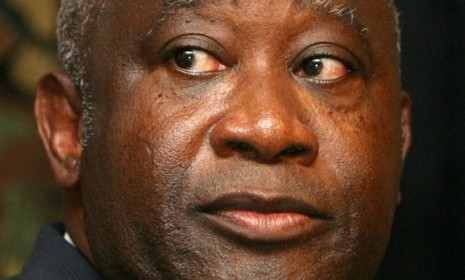Will Gbagbo's arrest end the Ivory Coast crisis?
The former president refused to give up power after losing an election last fall. Now that he's in custody, will his country finally find peace?

A free daily email with the biggest news stories of the day – and the best features from TheWeek.com
You are now subscribed
Your newsletter sign-up was successful
Aided by French tanks and helicopters, opposition forces captured the Ivory Coast's besieged former president, Laurent Gbagbo, on Monday, ending five months of fighting that left more than 1,000 Ivorians dead. Gbagbo had refused to surrender power after losing an election to his rival, Alassane Ouattara, in November. Now Ouattarra is personally guaranteeing Gbagbo's safety, saying he'll turn the former leader over to the courts. Ouattara also urged both sides to "abstain from all reprisals and violence." Is the country's bloody crisis over?
The nation is still sharply divided: It is soothing to view this as the triumph of good over evil, says Aaron Goldstein at The American Spectator, but it's not that simple. "Both sides have blood on their hands." And even after Ouattarra takes office, the southern, predominantly Roman Catholic part of Ivory Coast will still be loyal to Gbagbo, while the Muslim north supports Ouattara. Ultimately, the only way to "avert a full scale civil war" might be to split the nation in two.
The Week
Escape your echo chamber. Get the facts behind the news, plus analysis from multiple perspectives.

Sign up for The Week's Free Newsletters
From our morning news briefing to a weekly Good News Newsletter, get the best of The Week delivered directly to your inbox.
From our morning news briefing to a weekly Good News Newsletter, get the best of The Week delivered directly to your inbox.
But Ouattara offers hope: With Gbagbo's arrest, "the likelihood of outright civil war may have diminished," says Ishaan Tharoor in TIME, but "the hard work for Ouattara is only beginning." To avoid violence, Ouattara will have to disarm militias on both sides and form a "representative national army." But the new president is "making the right noises about investigating atrocities" and "healing wounds," so we can reasonably hope he'll take "the war-ravaged country forward to better times."
"After Gbagbo's arrest, what's next for the Ivory Coast?"
This "happy ending" may actually be a step backward: Viewed in the "wider context," this conclusion disturbs me, says Jody McIntyre at The Independent. France, which once controlled Ivory Coast as a colony, has "no right to invade an African country, let alone help one side of an internal conflict over-power another." It interfered not to restore the rule of law, but to assert its right to meddle in former colonies' affairs whenever it sees fit. That's not progress, it's just a "renewed form of colonialism."
"Cote D'Ivoire; neo-colonialism in action"
A free daily email with the biggest news stories of the day – and the best features from TheWeek.com
-
 ‘States that set ambitious climate targets are already feeling the tension’
‘States that set ambitious climate targets are already feeling the tension’Instant Opinion Opinion, comment and editorials of the day
-
 Mixing up mixology: The year ahead in cocktail and bar trends
Mixing up mixology: The year ahead in cocktail and bar trendsthe week recommends It’s hojicha vs. matcha, plus a whole lot more
-
 Labor secretary’s husband barred amid assault probe
Labor secretary’s husband barred amid assault probeSpeed Read Shawn DeRemer, the husband of Labor Secretary Lori Chavez-DeRemer, has been accused of sexual assault